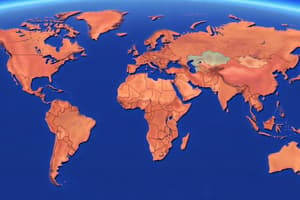Podcast
Questions and Answers
What does cultural geography focus on?
What does cultural geography focus on?
- Studying migration patterns only
- Analyzing climate change effects exclusively
- Investigating the impact of urbanization on societies
- Understanding the relationship between physical environments and human societies (correct)
Why do people move, according to the text?
Why do people move, according to the text?
- To influence political factors
- To increase natural resources in their area
- To change their cultural beliefs
- Due to environmental conditions (correct)
Which concept is NOT a key concept in cultural geography?
Which concept is NOT a key concept in cultural geography?
- Study of migration patterns
- Impact of climate change on weather patterns (correct)
- Natural resource examination
- Population distribution analysis
How has globalization impacted migration patterns?
How has globalization impacted migration patterns?
What is the main reason behind urbanization?
What is the main reason behind urbanization?
How have mass emigrations historically impacted landscapes?
How have mass emigrations historically impacted landscapes?
Which of the following factors contribute to the development of distinct cultural characteristics in cities?
Which of the following factors contribute to the development of distinct cultural characteristics in cities?
How do urban planning policies influence cultural geography?
How do urban planning policies influence cultural geography?
Which of the following factors plays a significant role in determining land use patterns?
Which of the following factors plays a significant role in determining land use patterns?
How can rising sea levels due to climate change impact human geography?
How can rising sea levels due to climate change impact human geography?
Which of the following aspects of daily life can reflect regional cultural identities?
Which of the following aspects of daily life can reflect regional cultural identities?
What is the primary goal of cultural geography as a field of study?
What is the primary goal of cultural geography as a field of study?
Flashcards are hidden until you start studying
Study Notes
Cultural Geography
Cultural geography is one of the branches within the field of human geography that examines how people's ways of life vary from place to place. It looks into how culture influences landscape and land use patterns. This discipline focuses on understanding the relationships between physical environments and the development of human societies around the world. Some key concepts in this area include the study of migration, urbanization, population distribution, natural resources, climate change effects, and their impact on society.
Migration Patterns
Migration has been a significant aspect of human geography since prehistoric times. People move due to various reasons such as economic opportunities, social change, environmental conditions, and political factors. These movements result in changes in population distribution and often shape the spatial aspects of cultures. For example, the mass emigrations from Europe during the late nineteenth century reshaped the landscapes of both the European countries they came from and the destinations they arrived at. Today, globalization has led to increased levels of international migration, with more people moving across borders than ever before.
Urbanization and Population Distribution
Urbanization refers to the process by which rural areas become urbanized as people migrate to cities seeking better job opportunities and improved living standards. This process has had profound impacts on global demographics and cultural geography. As cities grow in size, they often develop distinct cultural characteristics that reflect the diverse populations they attract. Additionally, urban planning policies can influence the design of cities, affecting how people interact with each other and their environment.
Natural Resources and Land Use Patterns
Natural resources play a crucial role in shaping human geography, influencing where settlements occur and what types of economies develop. For instance, agricultural regions tend to be concentrated near fertile land, while mining towns form around mineral deposits. Similarly, coastal cities often rely on maritime industries, such as fishing or shipping. Climate also plays a significant role in determining land use patterns; arid climates may support agriculture based on irrigation systems, whereas tropical climates favor plantation agriculture.
Effects of Climate Change on Society
Climate change poses significant challenges for human geography. As temperatures rise, sea levels increase, weather patterns shift, and ecosystems change, these alterations have far-reaching consequences for human societies. For example, rising sea levels can lead to coastal flooding and erosion, forcing people to relocate. Severe weather events can destroy homes and infrastructure, disrupting economies and social structures. Furthermore, climate change can affect agricultural productivity, potentially leading to food shortages and increased poverty.
Geography and Cultural Identity
Finally, cultural geography also examines how geography influences the development of cultural identity. Different regions often develop unique cultural practices, beliefs, and values that are shaped by their physical environment. These regional cultural identities can be seen in various aspects of daily life, including art, music, cuisine, and architecture. For example, the mountainous regions of Nepal have given rise to the distinctive architecture of the traditional Newari houses, while the arid climate of the Middle East has shaped the culinary traditions of the region.
In conclusion, cultural geography is a fascinating field that explores the complex relationships between people, their environments, and the cultural practices that develop as a result. By understanding these connections, we can gain a deeper appreciation for the diversity and richness of human cultures around the world.
Studying That Suits You
Use AI to generate personalized quizzes and flashcards to suit your learning preferences.




